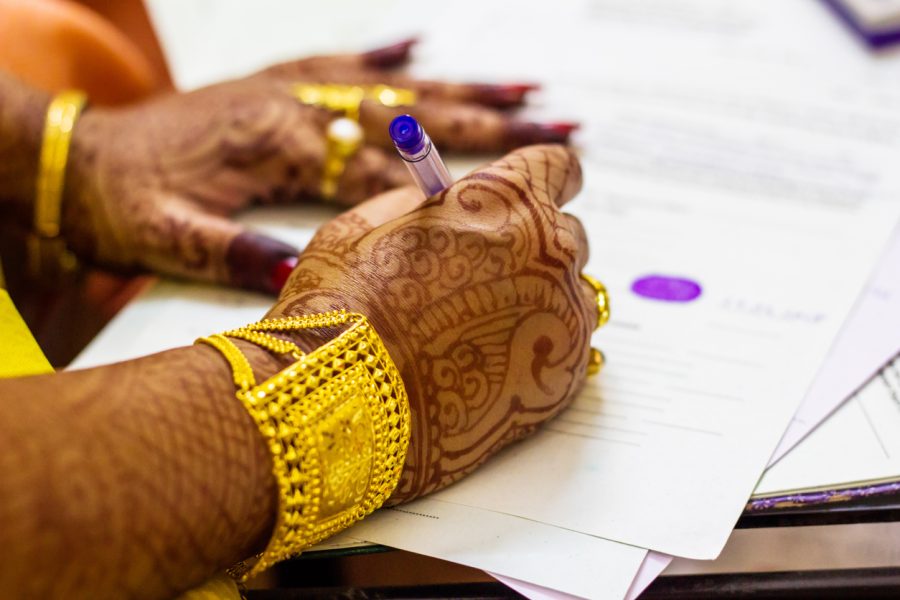
Why marriage registration should be on a couple’s wedding checklist
Registering a marriage provides legal security to both spouses, helps a partner avail benefits of family laws in a smoother way and stands very strong in court of law, in case of any dispute where the union is questioned

Do wedded couples need to register their marriage? What are the repercussions if they choose not to? Will it make their marriage null and void and strip them of legal benefits in future?
The questions are pertinent given the huge difference between the numbers of marriages solemnised and those that are registered in the country. Data recently released by the Delhi Revenue Department, said that of 63,000 applications received in the last three years, only 57,000 marriages got registered. This, despite Delhi being a wedding destination, and hosting thousands of weddings per day, especially in the months of October to December and January to March.
Also read: Sologamy comes to India: Funda behind Kshama Bindu’s self-marriage act
Experts say the 57,000 marriages that got registered in the national capital are just a poor representation of the massive number of marriages that get solemnised there. They say no less than five lakh marriages took place in Delhi-NCR in the past three years.
Advocate Vrinda Bajaj, reflecting upon the numbers, said most marriages are performed as per local customs and at no point are the law enforcement agencies involved at the wedding event. So, the figures are massively under-reported, she said.
Is registration mandatory? Hindu Marriage Act vs SC judgement
In an attempt to address issues like gender justice, the Supreme Court in 2006 ruled that all marriages — irrespective of the couple’s religion(s) — should be compulsorily registered. It directed both the Union and state governments to notify rules in this regard. The apex court termed the lack of mandatory provision for marriage registration a serious flaw in the matrimonial laws.
The ruling came as a major relief to beleaguered wives fighting for maintenance on break-up of marriages. It was an outcome of an appeal in a routine maintenance suit filed by a petitioner named Seema against her husband Ashwani Kumar. Ashwani had disputed their marriage in the absence of any documentary proof which Seema had failed to produce.
Speaking to The Federal, Bajaj clarified that under the Hindu Marriage Act of 1954, registration of marriage is not mandatory, but if done is good and would always be of help to the married couple. However, the Supreme Court judgment of 2006 made marriage registration mandatory, taking into account various problems arising out of non-registration.
The Supreme Court’s ruling has been invoked to make registration compulsory under the Delhi (Compulsory Registration of Marriage) Order, 2014.
“Non-registration of marriage does not nullify a marriage. Registration is merely a valid legal proof. If there are sufficient other ways to prove the marriage, such as photographs and witnesses, the mere lack of a registration document will not make the marriage invalid,” Bajaj said.
Why should couples register their marriage?
Explaining the benefits of registration, Bajaj said it provides security to both the partners, making things smoother in situations where rules and regulations are subject to change. For instance, if a spouse dies, the marriage registration certificate will enable the bereaved partner to claim various financial benefits such as insurance money, legal title to movable and immovable property, and inheritance, among others.
Marriage registration is made compulsory to acquire family law benefits, said Bajaj. A registered marriage is legally recognised and stands very strong in a court of law, in case of any dispute where a marriage is in question.
Echoing the same sentiment as the Supreme Court in its 2006 ruling, Bajaj said that the marriage certificate also helps to check bigamy and polygamy, which are illegal in India (except for Muslims, with a separate set of rules). “In the case of a marital dispute between the parties to the marriage, a marriage certificate confirms that the children are born out of a legal marriage. It helps couples to travel abroad on a spouse visa, and a marriage certificate is obligatory when applying for a residency in a different country,” added Bajaj.
Also read: Will Assam bride abide by ‘One pizza a month’ rule in wedding contract?
A proposal for making registration obligatory has been garnering support for years now. It has been seen that many times unscrupulous husbands altogether deny their marriage, leaving their wives in the lurch — be it for seeking maintenance, custody of children or inheritance of property.
Indians laws which ensure registration
Personal laws
Registration of marriage is compulsory under the Indian Christian Marriages Act, 1872. Under the Act, entries are made in the marriage register of the church soon after the ceremony, along with the signatures of the bridegroom, the bride, the officiating priest and witnesses.
In Muslim law, a marriage is regarded as a civil contract and the Qazi, or officiating priest, also records the terms of the marriage in a Nikahnama, which is handed over to the married couple.
Uniqueness of Special Marriage Act, 1954
The Special Marriage Act deals with inter-caste and inter-religion marriages. The Act differs from the Hindu Marriage Act primarily because it requires the registration of the marriage in order to declare it as a valid marriage. The unique feature of the Special Marriage Act is the compulsory registration of marriage which is meant to protect the interest of the parties and the children born from the wedlock.
Delhi (Compulsory Registration of Marriage) Order, 2014
The order is applicable to all marriages solemnised in Delhi irrespective of caste, creed and religion of the brides and grooms. The government took the step to make registration of marriages mandatory in compliance with the apex court’s 2006 order. Accordingly, the marriage has to be registered within 60 days of tying the nuptial knot.

